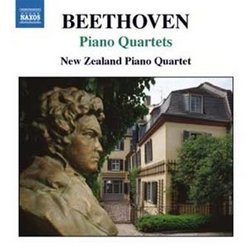| All Artists: New Zealand Piano Quartet Title: Beethoven: Piano Quartets Members Wishing: 0 Total Copies: 0 Label: Naxos Release Date: 5/26/2009 Genre: Classical Styles: Chamber Music, Historical Periods, Classical (c.1770-1830) Number of Discs: 1 SwapaCD Credits: 1 UPC: 747313099870 |
Search - New Zealand Piano Quartet :: Beethoven: Piano Quartets
CD Details |
CD ReviewsForgotten Beethoven Rediscovered... Sébastien Melmoth | Hôtel d'Alsace, PARIS | 06/28/2009 (5 out of 5 stars) "Forgotten Beethoven Rediscovered... . In approaching these rarely-heard gems, it would be well to suppress any subtle prejudice against "juvenilia," and simply appreciate the works for what they are: early blossoms of incipient genius. There is some very fine music here which stands on its own merit: for here we have neither Haydn nor Mozart, but Beethoven himself--albeit youthful. This is one of the points J.W.N. Sullivan draws in his fine little tome of Beethoven's Spiritual Development: that Beethoven's organic growth of nous and psyche continued unabated throughout his life in tandem with the evolution of his art. (In a naturalistic simile, we may consider the nautilus' shell which begins in a tight spiral and continuously unfolds following the lines of its design.) Beethoven: His Spiritual Development . The Piano Quartets WoO 36 date from 1785, and were found amongst Beethoven's papers after his death. The works already feature Beethoven's tendency towards expansive breath of expression, vigourous manner, and innate good taste. This nice recording displays the Quartets in their original compositional sequence, beginning with No. 3 in C-major which opens with a lively Allegro vivace, moving to an echt-Beethovenian characteristically dreamy Adagio con espressione, and concluding with a rustic Rondo. No. 1 begins with a lovely Adagio which segues into an impassioned Allegro con spirito, concluding with a Cantabile theme and VI variations. In examination of the text, Barry Cooper discerns from the orthography, "One cannot help suspecting that, even at the age of fourteen, Beethoven was technically a more advanced pianist than Mozart." Cooper further notes characteristics of Beethoven in the dramatic dynamic range (pp to ff ) and the gravitas engendered by the use of the bizarre key of eb-minor in the Allegro--(a key Beethoven would have encountered from his study of Bach's Well-Tempered Clavier). Here we have Beethoven already breaking out of the Classical mould in seeking his Romantic inner-vision. No. 2 begins with an affirmative Allegro which quietly peters out, giving way to a pathetic Andante and a concluding spirited Rondo--by turns both graceful and humorous. . Complete Beethoven Edition, Vol. 14: Misc. Chamber Works The Glenn Gould Edition - Bach: The Well-Tempered Clavier, Book I ." Good enough KenOC | SoCal | 04/24/2010 (4 out of 5 stars) "The attraction here is Beethoven's music, of course. Those interested in the early music of this extraordinary composer will certainly enjoy this disc. Mr. Dubin's review is quite accurate so I'll keep this short. If you listen to this music, you're likely to say, "Hey, this is first-class stuff. How come it's not better known?"
If you enjoy music in the classical style, you will certainly enjoy this. Regardless of Mr. Dubin's comments on intonation, I thank the New Zealand Piano Quartet for bringing us these gems." |

